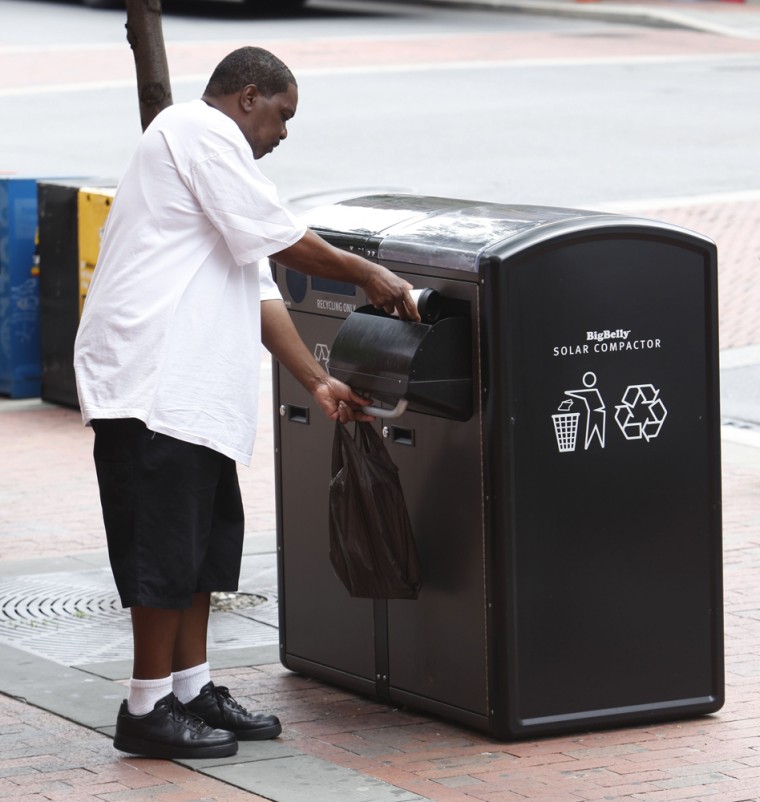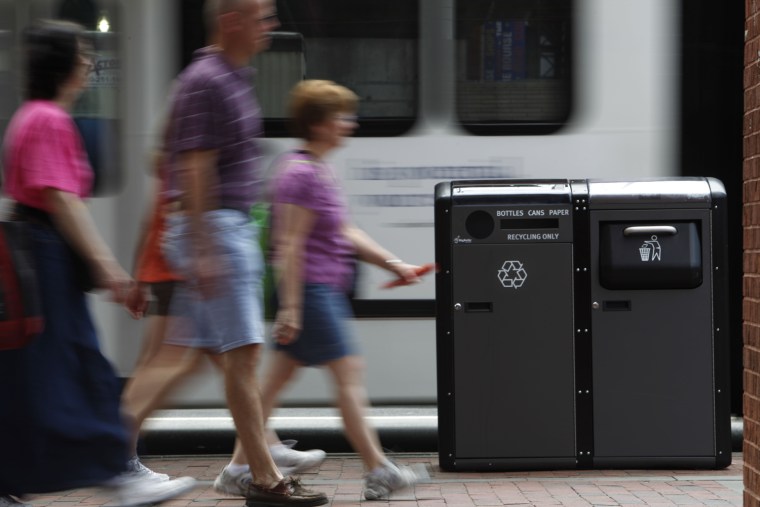Is it any surprise that a city known for its love of cheesesteaks, soft pretzels and cannolis would embrace a solar-powered trash compactor called a BigBelly?
In the largest rollout yet, Philadelphia has replaced 700 downtown trash bins with 500 of the high-tech compactors, which use solar energy to condense trash — cutting down collection trips by 75 percent.
Facing a $1.4 billion, five-year budget deficit, the city estimates it will save $875,000 a year with the compactors, bought with state grant money. Cities from Vienna to Boston to Vancouver have tried the devices in smaller numbers, but Philadelphia put them along four collection routes in its heavily traveled downtown area.
Streets Commissioner Carmina Tolson said the compactors, the last of which was installed this month, usually need to be emptied five times a week — as opposed to 19 times for a regular can. The change frees up 25 streets department employees, who are now filling vacancies on trucks that collect household recycling.
"We now can go all day," Tolson said of the 32-gallon compactors, which can hold 150 to 200 gallons of trash.
The devices are being piloted by governments and other entities in 40 states and 20 countries, but no other group is trying an approach as comprehensive as what Philadelphia is doing, said Richard Kennelly, vice president of marketing for BigBelly Solar, based in Needham, Mass.
The BigBelly is powered by sun, but it does not need direct light, Kennelly said. When trash gets to the top of the bin, it breaks an electronic beam that triggers a motor that pushes it down. As trash gets more densely packed, the machine senses the resistance and changes a light out front from green to yellow.
'We're full' alerts
In Philadelphia, the cans also have a wireless monitoring system that notifies the city when they're full. In addition, the city is introducing curbside recycling containers next to many of the compactors.
Boston first got the solar-powered compactors in 2006 and now has 160, using them everywhere from historic Faneuil Hall to Fenway Park, home of the Boston Red Sox.
"Our problem with them right now is we don't have them concentrated, we've got them spread," said Dennis Royer, Boston's chief of public works and transportation, who estimates the compactors pay for themselves in 18 months.
Royer said he would love to replace more of his 1,595 trash cans with the BigBelly. The city has also gotten businesses to purchase 20 or 30 of the compactors, which cost from $3,195 to $3,995 apiece.
About 100 BigBelly compactors are being used by various entities in New York, including the Bronx Zoo. Chicago has 90. Overseas, Vienna has 60, Vancouver about 30 and they are also being used in parts of Australia, Israel and France.
But Philadelphia is the first to use them in such big numbers, along whole collection routes.
"They really moved forward on this, primarily because of the cost savings," Kennelly said of Philadelphia officials.
Mayor's double-take
In a city once dubbed the nation's fattest, Philadelphia Mayor Michael Nutter initially did a double-take when an aide told him about the devices.
"What? Who's got a big belly?" he recalled asking.

But when he saw how they could save money and when the city came up with grant money to purchase them, he said, he warmed quickly. The city tested three of them last year and began adding them by the hundreds this year.
The targeted approach is also being tested in Somerville, Mass., where officials have focused them in densely packed areas.
Somerville has saturated its main square and several other areas, freeing up several streets department workers to repair potholes, trim trees and fix playground equipment, said Michael Lambert, director of transportation and infrastructure.
One lesson Royer learned in Boston was that workers needed to keep the cans very clean so that people didn't shy away from them.
And even though they need to be emptied less often, he said, their fullness needs to be carefully monitored — especially during big events.
"You don't want anything to discourage people from using them," he said.
